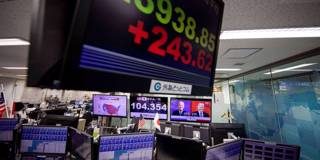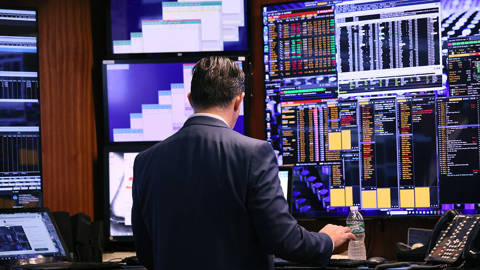To electoral observers who are heavily invested in the partisan outcome of the US elections, the delays in counting and free-wheeling allegations of fraud are enough to make November 2020 feel like the apocalypse. So why have stock prices gone on another tear?
NEW YORK – Even though uncertainty about the outcome of the US presidential election is likely to drag on, the stock market has been rallying. Provided that the election is decided within weeks – rather than months – and that both candidates ultimately accept the outcome as legitimate, business sentiment and household optimism can be expected to remain robust. Indeed, the only surprise this week is how close the Electoral College contest turned out to be. The delay in counting the votes was to be expected, and market ebullience and positive economic sentiment are in keeping with previous trends.
Insofar as the mainstream media’s pre-election forecasts were taken seriously, markets seem to have predicted – right up until November 3 – that Joe Biden would be a shoo-in, and that the Democrats would retake the Senate and maintain control of the House of Representatives. Had that happened, the Democrats might have interpreted their sweeping victory as a mandate for an activist progressive agenda. This likely would have included significant increases in public spending on goods and services (including health and education); business-unfriendly tax and regulatory reforms; more protectionist trade and foreign-investment policies; and far-reaching income redistribution (including boosts to Social Security and unemployment benefits). Markets would have perceived this agenda as bad for risk-asset valuations.
But now that Republicans are on course to retain control of the Senate and made surprising gains in the House, there will be no mandate for a bold Democratic agenda. Any policies that are enacted at all will have to win at least some bipartisan support. Lawmakers will be reduced to bargaining over measures that have broad buy-in, such as business-friendly cyclical fiscal stimulus. Compared to the earlier expectations of a blue wave, markets view this scenario as grounds for celebration.
To be sure, there has been a great deal of political messiness and dysfunction – including potential constitutional issues, baseless claims of election fraud, and a delay of several days or even weeks. But much of this was anticipated, given that the United States remains in the depths of a pandemic, and that US President Donald Trump has long signaled precisely how he would react to a close election. The media and election officials warned the electorate for months that there would be delays, and that the victor likely would not be known on Election Day. Demands for recounts were to be expected. This in itself is not worrisome; and recounts rarely change results.
In this unconventional election, with its large volume of mail-in ballots and exceptional rancor, it is entirely normal for either or both sides to respond to a close outcome with questions of whether rules were broken. But, again, as long as the proper authorities resolve these disputes in the next few weeks, markets most likely will tolerate the uncertainty.
On the other hand, if the final outcome is delayed to a degree that summons memories of the Bush vs. Gore dispute, which dragged on until December 12, 2000, market optimism and economic sentiment will probably start to suffer. There must be some inevitable point when the continued lack of resolution becomes a problem. Though it remains unlikely, the outright refusal by one of the candidates to accept the official outcome would have serious implications for markets and the US political system. Among other things, such a crisis would probably prevent the enactment of much-needed and overdue fiscal stimulus bills, leaving the US Federal Reserve, once again, as the only countercyclical game in town.
In any case, the most likely electoral outcome would have a positive impact on markets, and a more or less neutral effect on the wider economy. Biden is not a self-proclaimed socialist like Bernie Sanders, and he is almost certain to face Republican resistance in the Senate. Moreover, six of the nine Supreme Court Justices are now staunch conservatives. It is hard to imagine a seriously business-unfriendly agenda being implemented under these conditions. At the same time, a meaningful countercyclical fiscal stimulus package will be a foregone conclusion. As far as the markets are concerned, what’s not to like?











NEW YORK – Even though uncertainty about the outcome of the US presidential election is likely to drag on, the stock market has been rallying. Provided that the election is decided within weeks – rather than months – and that both candidates ultimately accept the outcome as legitimate, business sentiment and household optimism can be expected to remain robust. Indeed, the only surprise this week is how close the Electoral College contest turned out to be. The delay in counting the votes was to be expected, and market ebullience and positive economic sentiment are in keeping with previous trends.
Insofar as the mainstream media’s pre-election forecasts were taken seriously, markets seem to have predicted – right up until November 3 – that Joe Biden would be a shoo-in, and that the Democrats would retake the Senate and maintain control of the House of Representatives. Had that happened, the Democrats might have interpreted their sweeping victory as a mandate for an activist progressive agenda. This likely would have included significant increases in public spending on goods and services (including health and education); business-unfriendly tax and regulatory reforms; more protectionist trade and foreign-investment policies; and far-reaching income redistribution (including boosts to Social Security and unemployment benefits). Markets would have perceived this agenda as bad for risk-asset valuations.
But now that Republicans are on course to retain control of the Senate and made surprising gains in the House, there will be no mandate for a bold Democratic agenda. Any policies that are enacted at all will have to win at least some bipartisan support. Lawmakers will be reduced to bargaining over measures that have broad buy-in, such as business-friendly cyclical fiscal stimulus. Compared to the earlier expectations of a blue wave, markets view this scenario as grounds for celebration.
To be sure, there has been a great deal of political messiness and dysfunction – including potential constitutional issues, baseless claims of election fraud, and a delay of several days or even weeks. But much of this was anticipated, given that the United States remains in the depths of a pandemic, and that US President Donald Trump has long signaled precisely how he would react to a close election. The media and election officials warned the electorate for months that there would be delays, and that the victor likely would not be known on Election Day. Demands for recounts were to be expected. This in itself is not worrisome; and recounts rarely change results.
In this unconventional election, with its large volume of mail-in ballots and exceptional rancor, it is entirely normal for either or both sides to respond to a close outcome with questions of whether rules were broken. But, again, as long as the proper authorities resolve these disputes in the next few weeks, markets most likely will tolerate the uncertainty.
On the other hand, if the final outcome is delayed to a degree that summons memories of the Bush vs. Gore dispute, which dragged on until December 12, 2000, market optimism and economic sentiment will probably start to suffer. There must be some inevitable point when the continued lack of resolution becomes a problem. Though it remains unlikely, the outright refusal by one of the candidates to accept the official outcome would have serious implications for markets and the US political system. Among other things, such a crisis would probably prevent the enactment of much-needed and overdue fiscal stimulus bills, leaving the US Federal Reserve, once again, as the only countercyclical game in town.
In any case, the most likely electoral outcome would have a positive impact on markets, and a more or less neutral effect on the wider economy. Biden is not a self-proclaimed socialist like Bernie Sanders, and he is almost certain to face Republican resistance in the Senate. Moreover, six of the nine Supreme Court Justices are now staunch conservatives. It is hard to imagine a seriously business-unfriendly agenda being implemented under these conditions. At the same time, a meaningful countercyclical fiscal stimulus package will be a foregone conclusion. As far as the markets are concerned, what’s not to like?